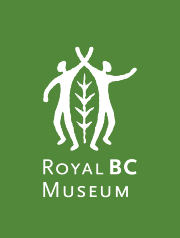Who has a garden? Many of us do, and many nourish their gardens with manure. Each winter, my wife and I get a heaping truck-load of manure – a mix of sheep, horse and chicken excrement from our friend’s farm up in Central Saanich. Sure our yard is a bit fragrant for a day or two, but the manure matures in winter while our neighbour’s windows are closed. Manure as a source of fertilizer is nothing new.
Watch any nature show on Africa and eventually you see scenes of Hippopotami (Hippopotamusses?) revving their tails to 30,000 RPM to spread their manure in their respective territories. Talk about leaving your mark on a place. But all that manure feeds fishes and is excellent fertilizer to increase productivity in their habitat. Streamside plants grow and the hippos have a convenient salad. Nature wastes nothing – not even waste is wasted.
One of the RBCM’s curators also lives according to nature’s mantra – he wastes nothing. I bet by now you are wondering where this blog post is going.
Every few days Grant Keddie combs through his scientific journals and cuts out articles to distribute to museum staff. This week I received an article from Grant from the journal NewScientist (page 6, 22 October 2016). The photograph tells it all – a Sperm Whale off-loading ballast as it dives, leaving a hazy russet cloud in its wake. The NewScientist article goes on to detail the role of whale feces in pelagic ecology. We rarely think about whale excrement – you know the old saying – out of sight, out of mind. If whales lived on land, we’d probably pay more attention to their gastrointestinal performance.

Images from: https://upload.wikimedia.org/wikipedia/commons/thumb/3/31/Diatoms_through_the_microscope.jpg/300px-Diatoms_through_the_microscope.jpg https://upload.wikimedia.org/wikipedia/commons/f/ff/Zooplankton.jpg
Nutrients in the intestinal ejecta of cetaceans are a windfall to phytoplankton and perhaps zooplankton. Whale poop fertilizes the sea, boosting phytoplankton and zooplankton populations – I am assuming some crustaceans also are coprophagous (they eat poop particles). Plankton blooms feed krill and fishes, and these of course support a myriad of marine organisms. Krill is now a popular source of Omega-3 oils – hhhmmmm.
Let it snow, let it snow, let it snow…
We’ve known for ages that most of the deep sea is dependent on a flurry of fecal matter and decaying organisms from near the surface. Only the deep sea hydrothermal vent communities live independent of such gifts from the surface. But it surprises me that we are only recently celebrating our largest neighbors colonic contribution to oceanic ecology.
The authors of the NewScientist article state that phytoplankton blooms supported by whale feces can help fight climate change (phytoplankton sequesters CO2). That seems to be a bit of a stretch, but their other claim that whales can increase local productivity and enhance fisheries certainly is interesting. In some areas of the world today (Norway, Iceland, and Japan), and within my lifetime here in BC, we have killed whales for oil but also to avoid sharing the ocean’s bounty. Yes, we killed whales to limit their impact on our fish harvests. If whale wastes enhance fisheries, removal of whales starved our coastal community.
In John Ford’s handbook of Marine Mammals of BC, he states that 25,460 whales were killed in our waters in the 20th century. I don’t have the global harvest estimates from the 1700s to present day, but whale losses run in the hundreds of thousands. In terrestrial terms, imagine trying to grow a garden without fertilizer? Now think how removal of a significant number of whales impacted the marine phytoplankton community. I have always wondered about the effect of losses of thousands of whales (and hundreds of basking sharks) on planktonic communities in BC, but the ecological joke is on me. I always looked at it from the top down, not the bottom up.



